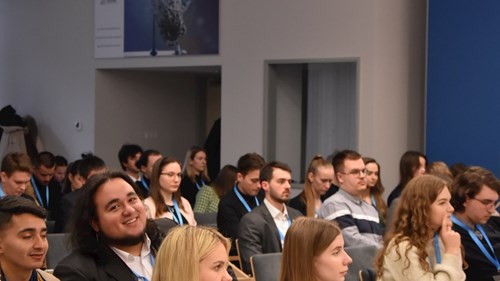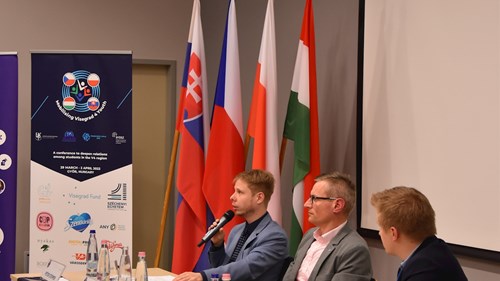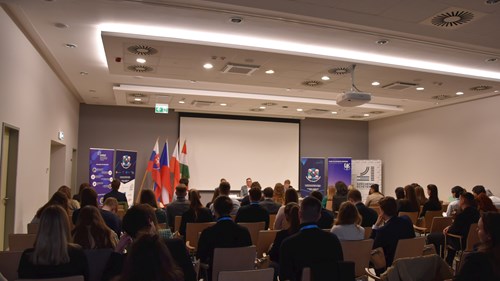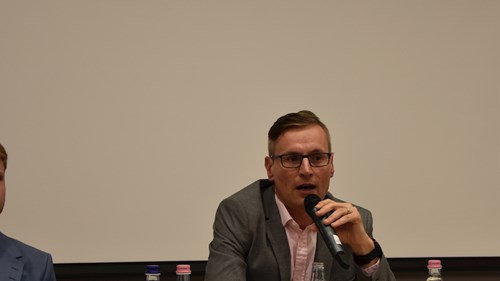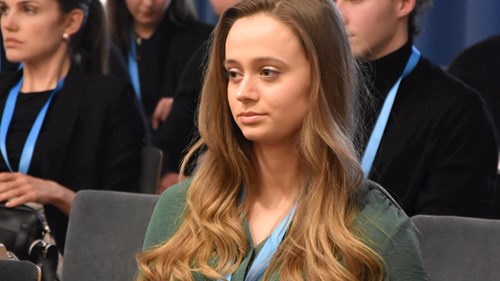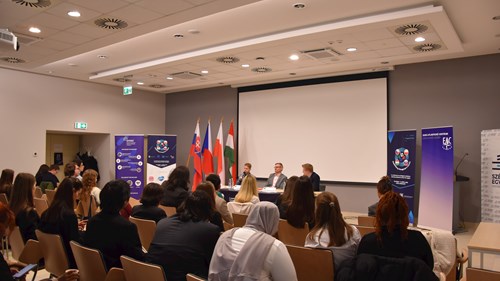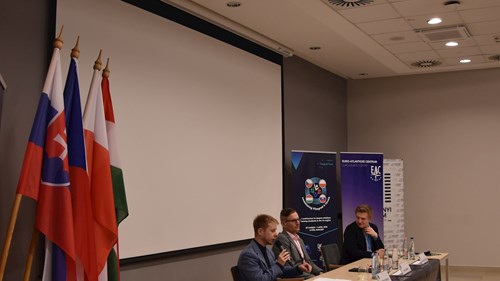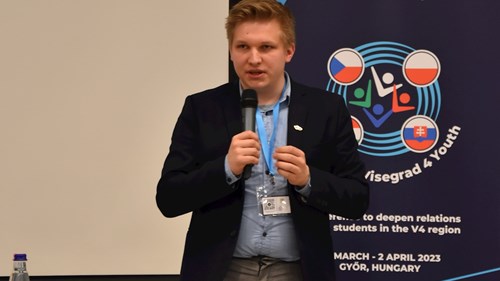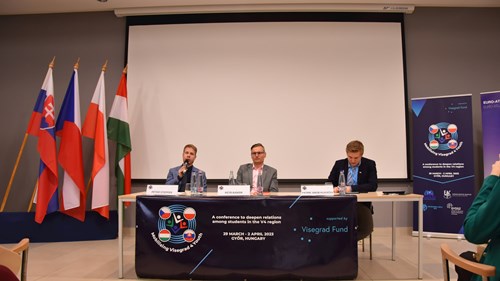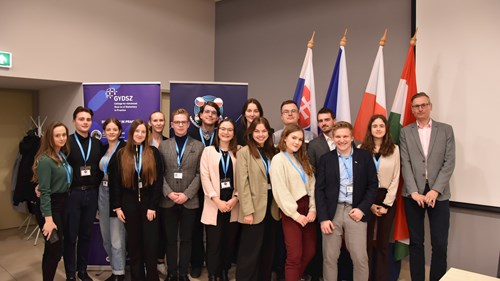V rámci konference Mobilising Visegrad 4 Youth se 30. března odpoledne na půdě maďarské univerzity v Györu uskutečnila debata oxfordského stylu na téma „Budoucnost V4“. Pozváni byli maďarský a český expert a debatou je provázel náš člen Bc. Patrik Jakub Hlaváček.
Stranu PRO V4 zastupoval doktor Peter Stepper, který působí jako vedoucí výzkumný pracovník a vedoucí euroatlantického programu Institutu pro zahraniční věci a obchod. V jeho výzkumu se zaměřuje na témata Visegrádské skupiny, bezpečnostní politiky a NATO. Stranu PROTI pak reprezentoval doc. PhDr. Petr Kaniok, Ph.D., který působí jako docent na Katedře mezinárodních vztahů a evropských studií FSS MU a Mezinárodním politologickém ústavu, jehož hlavními výzkumnými tématy je kromě V4 problematika politického systému EU, fungování institucí EU a otázka euroskepticismu.
Otázky byly kladeny v první řadě na efektivitu aliance, její budoucnost a postavení V4 v mezinárodní politice, s důrazem na její postavení v rámci Evropské unie.
Debatu otevřel doktor Stepper, který přes souhlas s tím, že v současnosti není V4 na svém politickém vrcholu, zastával názor, že stále přetrvávají společné rysy a zájmy zemí V4, které na úrovni regionální mohou být efektivně využity ke kooperaci v budoucnosti. Docent Kaniok se zaměřoval především na V4 v rámci evropské integrace a argumentoval, že V4 může mít budoucnost, pokud se navrátí k multilaterální spolupráci a opustí své zaměření jako aktéra v kontextu evropské integrace, kde se od migrační krize zájmy zemí V4 rozchází.
Dále Stepper zdůraznil nutnost institucionálního nastavení, které bude motivovat ke kooperaci mezi členskými státy, a to hlavně na úrovni ministrů, která zůstává stále velmi důležitá. V4 v současnosti vidí spíše jako platformu pro komunikaci mezi geopoliticky blízkými zeměmi, spíše než jako životně důležitou nebo vlivnou alianci. U otázky na zvýšení efektivity organizace se oba řečníci shodli na nutnosti upřímné komunikace mezi partnery, přičemž podle Steppera je potřeba soustředit se na pozadí našich rozdílů. Podle Kanioka je však nutné bavit se o současné situaci, ve které mají partneři až příliš rozdílné hodnoty a normy, především současná maďarská vláda. Konstatoval, že od roku 2015 si V4 poničila svou reputaci nejen na evropské úrovni, ale i v širším diskurzu a kritizoval negativní rétoriku V4, která postrádá nabídku relevantních řešení.
Poté se diskuze stočila k tématu kooperace Visegrádské čtyřky s kandidátskými zeměmi EU, ve kterém je sice V4 jednotná, ale Kaniok poukázal na fakt, že v této otázce je nezbytné dívat se i na kontext rozšiřování, který je složitý a problematický, např. nutná reforma rozhodovacích procesů v EU, se kterými by dle něj Polsko a Maďarsko mohlo mít značný problém.
V souvislosti s Visegrádským fondem Stepper pak následně podtrhl potřebu rozšířit podporu mobility i na lidi po ukončení studia a organizace, které již v této oblasti působí, aby byli i nadále motivování k další spolupráci.
Následně byl dán prostor pro otázky z publika, které se týkaly případné dezintegrace obdobných aliancí a problému hlubší integrace zemí V4 v rámci Evropské unie a eurozóny.
Věříme, že debata přinesla spoustu nových pohledů na Visegradskou spolupráci a děkujeme hostům i obecenstvu za účast na této debatě a obohacení zmíněné konference. Budeme se těšit na případnou další spolupráci.
Fotografie: Nikoletta Logginidu
English version
As part of the Mobilising Visegrad 4 Youth conference, a debate on "The Future of the V4" took place on 30 March at the University of Győr, Hungary. Hungarian and Czech experts were invited and the debate was moderated by our member Bc. Patrik Jakub Hlaváček.
The PRO V4 party was represented by Dr. Peter Stepper, who is a senior research fellow and head of the Euroatlantic program at the Institute for Foreign Affairs and Trade. His research focuses on the topics of the Visegrad partnership, security policy and NATO. The party AGAINST was represented by doc. Petr Kaniok, PhDr., Ph.D., who works as an associate professor at the Department of International Relations and European Studies of the Faculty of Social Sciences of Masaryk University and the International Institute of Political Science, whose main research topics, apart from the V4, are the EU political system, the functioning of EU institutions and the issue of Euroscepticism.
The questions were asked primarily about the effectiveness of the alliance, its future, and the position of the V4 in international politics, with an emphasis on its position within the European Union.
The debate was opened by Dr. Stepper, who, despite agreeing that the V4 is not at its political peak at the moment, was of the opinion that there are still common features and interests of the V4 countries that can be effectively used at the regional level for collaboration in the future. Associate Professor Kaniok focused primarily on the V4 in the context of European integration, arguing that the V4 can have a future if it returns to multilateral cooperation and abandons its focus as an actor in the context of European integration, where the interests of the V4 countries have diverged since the migration crisis.
Furthermore, Stepper stressed the need for an institutional set-up that will motivate cooperation between member states, especially at the ministerial level, which remains very important. He sees the V4 currently as a platform for communication between geopolitically close countries rather than a vital or influential alliance. On the issue of increasing the effectiveness of the organization, both speakers agreed on the need for honest communication between partners, with Stepper saying that we need to focus on the background of our differences. However, Kaniok said it is necessary to talk about the current situation in which the partners have too different values and norms, especially the current Hungarian government. He noted that since 2015 the V4 has damaged its reputation not only at the European level but also in the wider discourse and criticised the V4's negative rhetoric, which lacks offering relevant solutions.
The discussion then turned to the topic of cooperation between the Visegrad Group and the EU candidate countries, on which the V4 is united, but Kaniok pointed out that on this issue it is essenial to look at the context of enlargement, which is complex and problematic, such as the necessary reform of decision-making processes in the EU, with which, in his opinion, Poland and Hungary could have a significant problem.
In the context of the Visegrad Fund, Stepper underlined the need to extend mobility support to post-graduates and organizations already active in this field, so that they continue to be motivated to cooperate further.
The floor was then opened for questions from the audience regarding the possible disintegration of similar alliances and the problem of deeper integration of the V4 countries within the European Union and the Eurozone.
We believe that the debate brought many new perspectives on Visegrad cooperation, and we thank the guests and the audience for participating in this debate and enriching the mentioned conference. We look forward to further potential cooperation.



